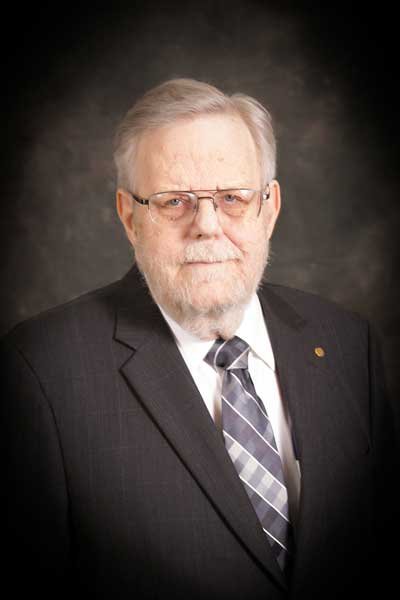Death has taken another cherished member of the Emporia State University Athletics Department.
 Dr. Marshall A. (Jack) Havenhill II, 81, died Tuesday, May 2, in his home. He had resigned late last month for health reasons after serving 34 years as team physician and adjunct faculty member.
Dr. Marshall A. (Jack) Havenhill II, 81, died Tuesday, May 2, in his home. He had resigned late last month for health reasons after serving 34 years as team physician and adjunct faculty member.
His passing came one day short of six months after the death of long-time Hornet athletic head trainer and instructor Dr. John (Doc) Baxter, with whom he had worked in tandem for many years.
Garin Higgins knew both men well. They had treated him when he was a student athlete, then worked with him as a professional when he returned to Emporia State in 2007 as head football coach.
Losing both within a matter of months has been a blow to the athletics department and others across campus.
“I had two ‘Docs’ and now they’re up in heaven taking care of angels,” Higgins said. “They just represented what Emporia State Athletics was all about.”
Whether Havenhill was stitching up a head gash in the training room or prescribing medication for strep throat, his priority was student athletes and athletics.
“It was more than just a job with him,” Higgins said. “I think we were part of his family, and I think you could see that in how he went about his business each and every day.
“He wasn’t a clock-in, clock-out guy. Doc was going to give whatever time necessary to help take care of the student athletes, no question.”
Havenhill, a sports fan at heart, had taken a keen interest in the football program and liked to talk with the coach about how the season was going.
“Of course he would give me his opinion, and I would always listen,” Higgins said.
Matt Howe, athletic training program director and associate professor of health, physical education and recreation, had met Havenhill as instructor and mentor in the athletic training undergraduate program in 2001. He worked with the doctor as a student trainer before being certified and becoming a graduate assistant for soccer and softball teams.
When Howe took over the training program, Havenhill stayed deeply involved in preparing students to become trainers. The doctor and the director worked together to set lesson and competency plans that not only would meet accreditation requirements but exceed them. Havenhill exceeded expectations, too, as he taught classes, graded papers and met with Howe three times a week to discuss individual student progress and needs.
“I think he really enjoyed the teaching side of it, passing his knowledge on and challenging students to bring up their game,” Howe said. “We weren’t making doctors, but he was still teaching them to that level, and he was expecting that level of work out of them.”
The doctor welcomed opportunities to teach, whether it was in the classroom or on-site, stitching up an injury at a ball game in the training room or on the field.
“He’d look across the room and see what student was available and say, ‘You, come over here. You’re going to learn something right now,’” Howe recalled.
Havenhill demanded as much of himself as the students, Howe said; he continually read and researched advances in medicine and technology to ensure the students were studying the most-current information available.
Havenhill had been an attentive student himself. He received both a bachelor’s degree in physics and a medical degree from the University of Kansas, where he won the Haden Medal for the Best Original Research by a Medical Student.
He served a residency in obstetrics and gynecology at the University of Kansas Medical Center, then served on active duty in the U.S. Army Medical Corps before coming to Emporia to practice in his medical specialty more than 48 years ago. He also had been an emergency room physician as well as director of student health services at Emporia State.
He had been a member of the Kansas State Board of Healing Arts Athletic Training Advisory Council, received the Athletic Club Service Award in 1997 and the Emporia State University Service Citation in 2007.
Havenhill had seemed a natural-born caretaker and teacher of humanity in general, the environment and the animals within it.
He had been interested especially in the dwindling numbers of polar bears. An advocate for their protection, he and his wife, Ann, made trips to the far north to observe the bears and the melting sea ice habitat that makes them vulnerable to extinction. He also had volunteered for several years at the Tallgrass Prairie National Preserve in Chase County.
Improved health care in the Emporia community also had been a major interest. The couple had been lead sponsors in 2015 to raise money for a fetal-monitoring system at Newman Regional Health.
Havenhill had been named president of the Flint Hills Community Health Center board of directors in March of this year; in April, he resigned, after serving on the board for 14 years.
Phillip Davis, FHCHC chief executive officer, said that Havenhill left a legacy at the center.
He had a long-term vision for the center and was instrumental in helping form a facilities master plan for growth and expansion, Davis said. He also was a strong voice on the continuous quality improvement committee.
“I will miss being able to go for him for guidance, advice and honest feedback,” Davis said, saying Havenhill had been a mentor and a sounding board.
“We are already exploring ways that we can honor his service to our organization. We’re very thankful for all he’s done to promote the health and well-being of this community.”
Memorial gifts in Dr. Havenhill’s name may be sent to the Emporia State University Foundation, 1500 Highland St., Emporia KS 66801, where the couple several years ago established the Dr. Marshall A. Havenhill II and Ann J. Havenhill Scholarship.
